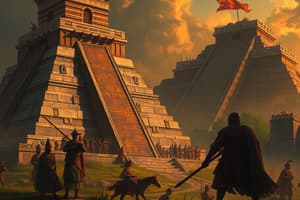Podcast
Questions and Answers
Pizarro captured and controlled the ______ empire.
Pizarro captured and controlled the ______ empire.
Inca
Cortés faced more direct military engagement in ______.
Cortés faced more direct military engagement in ______.
Mexico
Pizarro benefited from internal divisions within the ______ empire.
Pizarro benefited from internal divisions within the ______ empire.
Inca
Pizarro's actions were often justified by beliefs of cultural and religious ______.
Pizarro's actions were often justified by beliefs of cultural and religious ______.
Pizarro's conquest brought immense wealth to ______.
Pizarro's conquest brought immense wealth to ______.
The Spanish viewed the conquest as a way to spread ______ and civilization.
The Spanish viewed the conquest as a way to spread ______ and civilization.
The fall of the Aztec Empire marked a pivotal moment in history, initiating the ______ Exchange.
The fall of the Aztec Empire marked a pivotal moment in history, initiating the ______ Exchange.
Technological advancements like ship design and ______ were essential during the Age of Exploration.
Technological advancements like ship design and ______ were essential during the Age of Exploration.
Allied indigenous groups often faced ______ and exploitation under Spanish rule after the conquest.
Allied indigenous groups often faced ______ and exploitation under Spanish rule after the conquest.
The Spanish conquest had devastating effects on the Aztec culture and led to a major loss of ______ and language.
The Spanish conquest had devastating effects on the Aztec culture and led to a major loss of ______ and language.
Portuguese exploration in the 15th century opened ______ routes that connected different civilizations.
Portuguese exploration in the 15th century opened ______ routes that connected different civilizations.
The Spanish justified their actions with a sense of religious and cultural ______.
The Spanish justified their actions with a sense of religious and cultural ______.
The conquest of Peru by Pizarro shared similarities with the conquest of Mexico by ______.
The conquest of Peru by Pizarro shared similarities with the conquest of Mexico by ______.
Flashcards
Pizarro's Conquest: Similarities
Pizarro's Conquest: Similarities
Pizarro's conquest of Peru shares similarities with Cortes' conquest of Mexico, including exploiting alliances, internal conflicts, and technological superiority.
Pizarro's Conquest: Differences
Pizarro's Conquest: Differences
Pizarro's conquest of Peru differed from Cortes' conquest of Mexico by facing less organized resistance and benefiting from internal divisions in the Inca Empire.
Pizarro: Villain Perspective
Pizarro: Villain Perspective
Pizarro is often viewed as a villain for capturing and controlling the Inca Empire, breaking promises, and causing death and destruction.
Pizarro: Hero Perspective
Pizarro: Hero Perspective
Signup and view all the flashcards
Pizarro's Legacy: Debate
Pizarro's Legacy: Debate
Signup and view all the flashcards
Spanish Justification for Conquest
Spanish Justification for Conquest
Signup and view all the flashcards
Impact of Conquest on the Aztec
Impact of Conquest on the Aztec
Signup and view all the flashcards
Allied Indigenous Groups & Conquest
Allied Indigenous Groups & Conquest
Signup and view all the flashcards
Columbian Exchange
Columbian Exchange
Signup and view all the flashcards
Rise of European Power
Rise of European Power
Signup and view all the flashcards
Portuguese Exploration's Impact
Portuguese Exploration's Impact
Signup and view all the flashcards
Technology and Global Power
Technology and Global Power
Signup and view all the flashcards
Pizarro's Conquest of Peru vs. Cortes' Conquest of Mexico
Pizarro's Conquest of Peru vs. Cortes' Conquest of Mexico
Signup and view all the flashcards
Study Notes
Ethical Implications of the Spanish Conquest
- Spanish perspective often justified conquest through claims of cultural and religious superiority, intending to bring Christianity and civilization.
- Aztec perspective viewed the conquest as catastrophic, leading to destruction of culture, loss of life, and the spread of disease.
- Allied indigenous groups experienced exploitation and subjugation under Spanish rule.
Fall of the Aztec Empire and World History
- The fall led to significant global shifts, notably the Columbian Exchange – a crucial exchange of goods, diseases, and ideas between the Americas and Europe.
- European powers, particularly Spain, gained immense wealth and influence, shaping emerging empires and colonialism.
Portuguese Exploration and World History
- Portuguese exploration in the 15th century was crucial, establishing trade routes and fostering interaction amongst various civilizations.
- This global interconnectedness redefined world power dynamics.
Technological Advancements in the Age of Exploration
- Advanced ship design and gunpowder technology allowed European powers to dominate trade, establish empires, and subdue resistance.
- These innovations drastically reshaped global power dynamics and marked the rise of Europe.
Comparison of the Pizarro and Cortés Conquests
- Similarities: Exploitation of alliances, internal conflicts, and technological superiority during both conquests.
- Differences: Cortés faced greater initial resistance, followed by more direct military encounters, while Pizarro benefited from deeper Inca internal divisions and less organized opposition, leading to rapid Spanish control.
Pizarro: Hero or Villain?
- Villain: Viewed through indigenous perspectives – exploitation, broken promises, killing, and destruction.
- Hero: Viewed from a Spanish 16th-century perspective – conquest brought wealth and power for Spain, seen as bringing Christianity and civilization.
Studying That Suits You
Use AI to generate personalized quizzes and flashcards to suit your learning preferences.
Description
This quiz explores the ethical implications surrounding the Spanish Conquest from multiple perspectives. It examines the justifications used by the Spanish and the catastrophic effects on the Aztec culture, as well as the broader global consequences of European conquests. Engage with various viewpoints to better understand these historical events.




